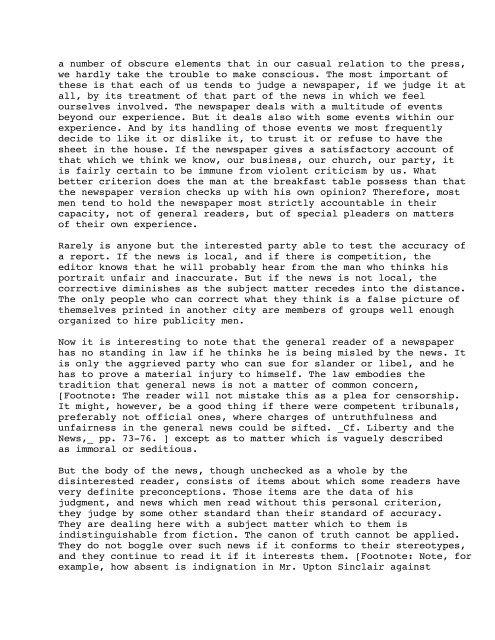PUBLIC OPINION by WALTER LIPPMANN TO FAYE LIPPMANN ...
PUBLIC OPINION by WALTER LIPPMANN TO FAYE LIPPMANN ...
PUBLIC OPINION by WALTER LIPPMANN TO FAYE LIPPMANN ...
You also want an ePaper? Increase the reach of your titles
YUMPU automatically turns print PDFs into web optimized ePapers that Google loves.
a number of obscure elements that in our casual relation to the press,<br />
we hardly take the trouble to make conscious. The most important of<br />
these is that each of us tends to judge a newspaper, if we judge it at<br />
all, <strong>by</strong> its treatment of that part of the news in which we feel<br />
ourselves involved. The newspaper deals with a multitude of events<br />
beyond our experience. But it deals also with some events within our<br />
experience. And <strong>by</strong> its handling of those events we most frequently<br />
decide to like it or dislike it, to trust it or refuse to have the<br />
sheet in the house. If the newspaper gives a satisfactory account of<br />
that which we think we know, our business, our church, our party, it<br />
is fairly certain to be immune from violent criticism <strong>by</strong> us. What<br />
better criterion does the man at the breakfast table possess than that<br />
the newspaper version checks up with his own opinion? Therefore, most<br />
men tend to hold the newspaper most strictly accountable in their<br />
capacity, not of general readers, but of special pleaders on matters<br />
of their own experience.<br />
Rarely is anyone but the interested party able to test the accuracy of<br />
a report. If the news is local, and if there is competition, the<br />
editor knows that he will probably hear from the man who thinks his<br />
portrait unfair and inaccurate. But if the news is not local, the<br />
corrective diminishes as the subject matter recedes into the distance.<br />
The only people who can correct what they think is a false picture of<br />
themselves printed in another city are members of groups well enough<br />
organized to hire publicity men.<br />
Now it is interesting to note that the general reader of a newspaper<br />
has no standing in law if he thinks he is being misled <strong>by</strong> the news. It<br />
is only the aggrieved party who can sue for slander or libel, and he<br />
has to prove a material injury to himself. The law embodies the<br />
tradition that general news is not a matter of common concern,<br />
[Footnote: The reader will not mistake this as a plea for censorship.<br />
It might, however, be a good thing if there were competent tribunals,<br />
preferably not official ones, where charges of untruthfulness and<br />
unfairness in the general news could be sifted. _Cf. Liberty and the<br />
News,_ pp. 73-76. ] except as to matter which is vaguely described<br />
as immoral or seditious.<br />
But the body of the news, though unchecked as a whole <strong>by</strong> the<br />
disinterested reader, consists of items about which some readers have<br />
very definite preconceptions. Those items are the data of his<br />
judgment, and news which men read without this personal criterion,<br />
they judge <strong>by</strong> some other standard than their standard of accuracy.<br />
They are dealing here with a subject matter which to them is<br />
indistinguishable from fiction. The canon of truth cannot be applied.<br />
They do not boggle over such news if it conforms to their stereotypes,<br />
and they continue to read it if it interests them. [Footnote: Note, for<br />
example, how absent is indignation in Mr. Upton Sinclair against





